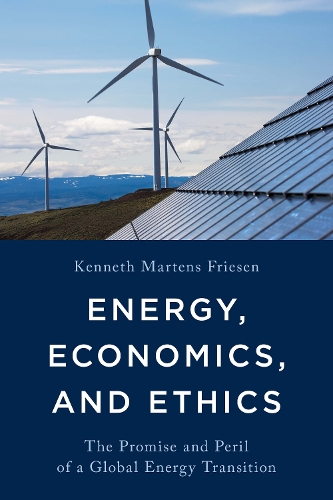
Energy, Economics, and Ethics: The Promise and Peril of a Global Energy Transition
(Hardback)
Available Formats
Publishing Details
Energy, Economics, and Ethics: The Promise and Peril of a Global Energy Transition
By (Author) Kenneth Martens Friesen
Bloomsbury Publishing PLC
Rowman & Littlefield International
12th November 2019
United Kingdom
Classifications
Professional and Scholarly
Non Fiction
Social and political philosophy
Geopolitics
333.79
Winner of CHOICE Outstanding Academic Title 2020 2020
Physical Properties
Hardback
216
Width 158mm, Height 232mm, Spine 23mm
508g
Description
We are in the midst of an enormous global energy transition happening before our eyes. Alternative energy forms including solar, wind, water, and bio-fuels are challenging the established energy sources that have fuelled the industrial era for the past century. As we look to this century's energy future an examination of the past is important to understand how these choices will be made. What political, economic, and ethical lessons can be learned from how coal, oil, and natural gas became the power of the 20th century Are those lessons instrumental in determining future decisions about emerging alternative energy choices The opportunities and the risks involved in making, or not making these choices are enormous. Through case studies and examples of past and present development of energy sources, the story is told of the global energy industry. In its telling Energy, Economics, and Ethics wrestles with many of the difficult questions at the heart of the emerging global energy transition
Reviews
Friesen (international studies and history, Fresno Pacific Univ.) understands that the causes of (and solutions to) the climate change crisis are linked to energy use. In this volume he puts energy use in historical context by explaining how economic incentives and cultures have driven energy choices. He uses the US, Germany, China, and India as examples, devoting chapters to each. Friesen highlights the human consequences by beginning the chapter on each country with a case study showing how energy use has changed over three generations for a single actual family. He then focuses on global energy transitions, revealing a nuanced understanding of economic, political, and ethical considerations. The final chapter looks to the future, first from a pessimist's perspective and then from an optimist's. This overview of the rise and future demise of fossil fuels is comprehensive, accurate, fair, and scary, the last because it is not clear that the world will react appropriately to ethical imperatives, both spatial and intergenerational. A well-written examination of how we got where we are and why fundamental change is necessary and at the same time problematic. Summing Up: Essential. All readers.
Author Bio
Kenneth Martens Friesen is an Associate Professor of International Studies and History at Fresno Pacific University.
